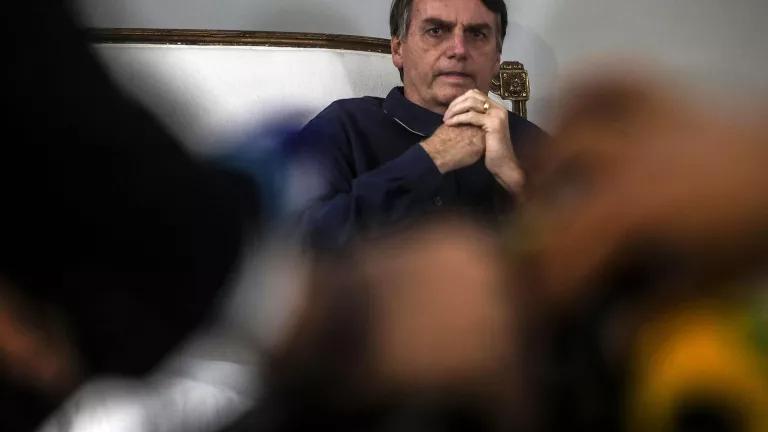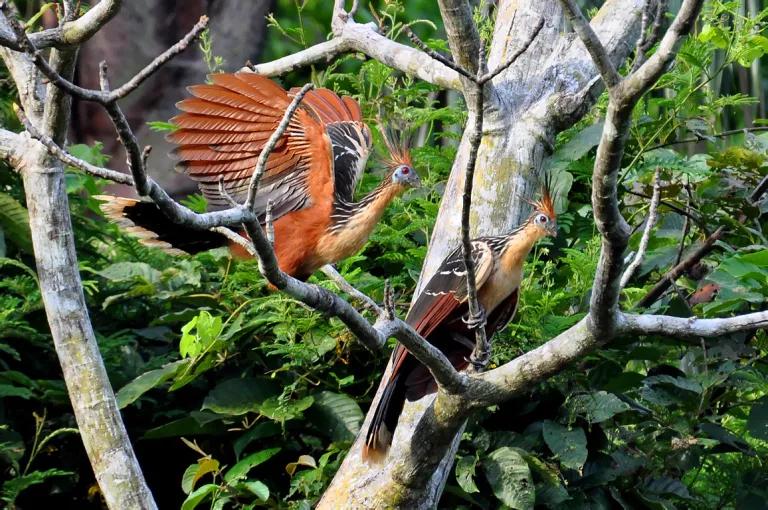Brazil’s Next President Could Be a Nightmare for the Amazon (and the Rest of the World)
Jair Bolsonaro says there’s too much “wealth underneath it” to leave the rainforest alone.

Jair Bolsonaro at a press conference in Rio de Janeiro, October, 2018
Brazilians have just elected an illiberal hypernationalist, Jair Bolsonaro, as their next president. The 63-year-old former military officer and seven-term lawmaker didn’t just eke out a victory; he won fairly decisively, with 55 percent of the vote, reflecting a broad and disturbing level of support among the electorate. During his campaign, Bolsonaro said unconscionably horrible things about women, black and indigenous people, and the LGBTQ community; he has also called for jailing his political enemies and has expressed his deep admiration for Brazil’s Cold War–era dictatorship, criticizing it only for not killing even more dissidents during its murderous 21-year reign.
There are many reasons, in other words, to lament the rise of this divisive, authoritarian figure to the leadership of South America’s largest country and the world’s eighth-largest economy. But high on the list is Bolsonaro’s expressed desire to further open up the Amazon rainforest to agribusiness. Such a move would exacerbate the deforestation of the world’s largest rainforest, potentially displacing more than a million indigenous people and degrading a globally crucial carbon sink.
“Where there is indigenous land, there is wealth underneath it,” said Bolsonaro during his campaign, furthermore vowing that “there won’t be a square centimeter demarcated as an indigenous reserve” once he becomes president. Such statements seem even more menacing in the context of his stated plans to discontinue his country’s Environment Ministry as a free-standing agency and instead make it a subset of Brazil’s Agriculture Ministry, which is closely allied with the country’s industrial farming sector.
“Save the Rainforest” has been a slogan of the global environmentalist movement for so many decades now that it’s possible to overlook what, exactly, is at stake here. Covering more than two million square miles, the tropical forest ecosystem known as the Amazon stretches over nine South American countries, although 60 percent of it falls within Brazil’s borders. The rainforest is a marvel of animal biodiversity, home (at last count) to some 3,000 species of fish, 1,300 birds, 427 mammals, 400 amphibians, and 378 reptiles.
And then there’s the globally significant matter of its plant diversity. The Amazon rainforest hosts more than 40,000 types of plants and about 390 billion individual trees, representing 16,000 different species. All of that vegetation, spread out over all those millions of square miles, makes the Amazon one of the planet’s largest carbon sinks and providers of oxygen, which is why many people refer to the Amazon as the “lungs of the planet.”
But deforestation has taken its toll. The Amazon has decreased in size by an estimated 17 percent over the last half century. Cattle ranching, in particular, has driven the phenomenon, accounting for 80 percent of it, while agriculture is responsible for most of the rest. After making real progress on the conservation front starting around 2005, Brazil began losing ground—both literally and figuratively—just a few years ago. In one recent 12-month period alone, from August 2015 to July 2016, more than 3,000 square miles of forest disappeared.

In other words, Brazil is at a crossroads when it comes to deforestation. But Bolsonaro has made it quite clear which path he’s choosing, and his decision has many Brazilians worried. In a recent tweet, Marina Silva, the country’s former environment minister, expressed her fear that Brazil is “entering a tragic time in which environmental protection will amount to nothing. The Bolsonaro government hasn’t even started and the backsliding is already incalculable.”
The rest of the world should be worried too. One international team of scientists estimates that the implementation of Bolsonaro’s policies could result in an annual loss of 10,000 square miles of rainforest—“a figure similar to the deforestation rates measured at the beginning of the 2000s and an increase of 268 percent from 2017.” Deforestation at that level would not just be a local problem. The clear-cutting could well lead to an atmospheric increase of 13.1 gigatons of carbon dioxide equivalent between 2021 and 2030. That amount, the scientists say, would represent up to a fifth of the world’s remaining “free” carbon budget to keep the atmosphere from warming more than 1.5 degrees Celsius—a goal that’s receiving a lot of attention lately, after the Intergovernmental Panel on Climate Change’s most recent (and most troubling) report.
Writing in the New Republic, environmental journalist Emily Atkin frames it this way: Bolsonaro’s presidency “threatens more than just the fourth-largest democracy in the world. The livability of the entire planet is at stake.” Pressure from other world leaders is likely to prove useless; like President Donald Trump, whom he admires greatly, Bolsonaro is the type of nationalist for whom international opprobrium is worn, perversely, as a badge of honor.
But there’s still hope. Eduardo Viola, a professor of international relations at the Universidade de Brasília and a coauthor of the book Brazil and Climate Change, believes that market pressures may ultimately be able to achieve what international political pressure can’t. He recently told National Geographic magazine that Brazilian ranchers and farmers definitely don’t want their products (primarily beef and soy) to be automatically linked in the public mind with destruction of the world’s largest rainforest. In his words, they “understand that a negative image of Brazil in regards to the Amazon and climate change will hurt Brazilian exports.”
If it’s really true that Bolsonaro and his Brazilian Big Ag backers aren’t inclined to listen to anyone but consumers, it may be time to think about boycotting Brazilian agricultural products on an international scale. It worked when fish lovers took a pass on endangered Chilean seabass. Should the worst predictions about Brazil’s new president come true, could a “Take a Break from Brazilian Steak” campaign be coming soon?
This article was originally published on onEarth, which is no longer in publication. onEarth was founded in 1979 as the Amicus Journal, an independent magazine of thought and opinion on the environment. All opinions expressed are those of the authors and do not necessarily reflect the policies or positions of NRDC. This article is available for online republication by news media outlets or nonprofits under these conditions: The writer(s) must be credited with a byline; you must note prominently that the article was originally published by NRDC.org and link to the original; the article cannot be edited (beyond simple things such grammar); you can’t resell the article in any form or grant republishing rights to other outlets; you can’t republish our material wholesale or automatically—you need to select articles individually; you can’t republish the photos or graphics on our site without specific permission; you should drop us a note to let us know when you’ve used one of our articles.


Can Anything Be Done to Stop Overfishing?
Saving Big Mammals Fights Extinction and Climate Change
Biodiversity 101